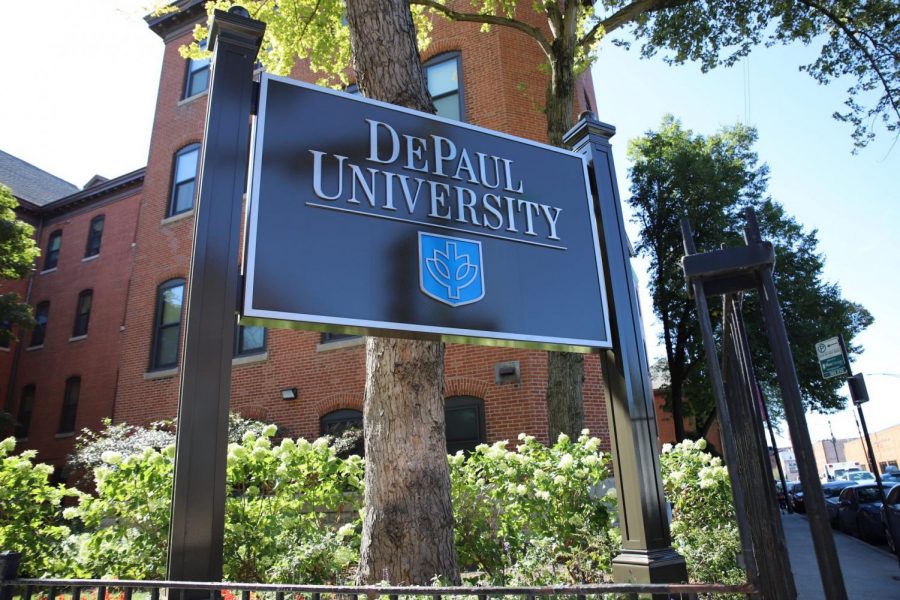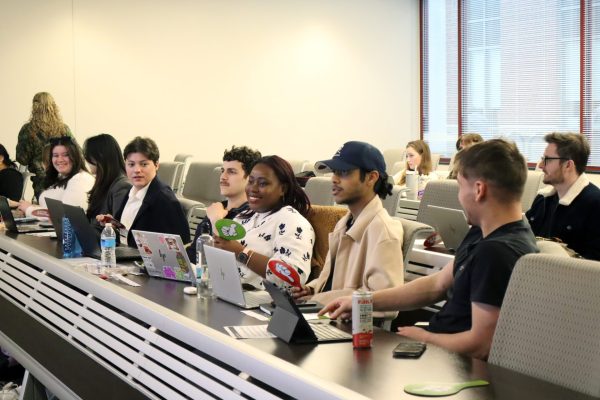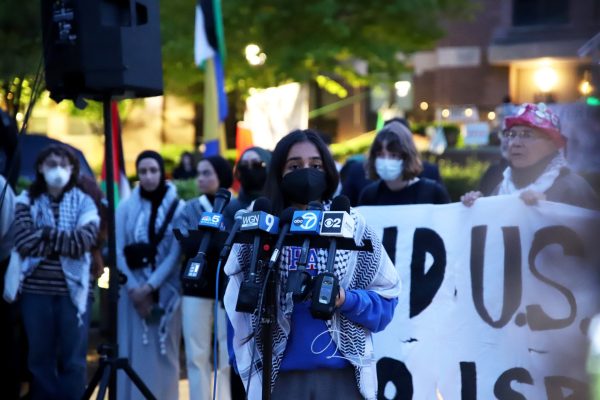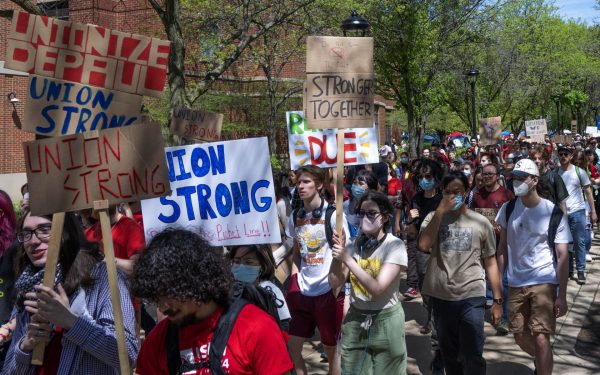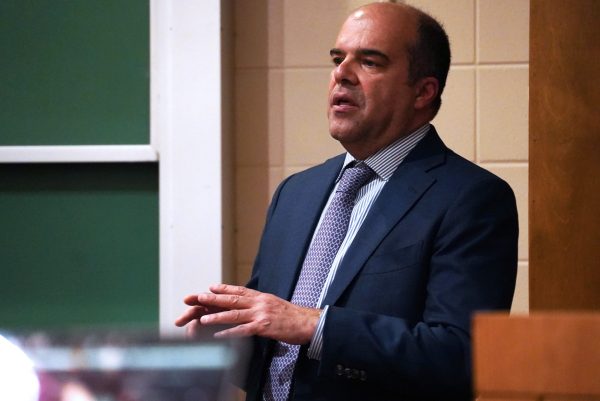DePaul’s vice president of enrollment joins SGA general body meeting to discuss university enrollment numbers, answer questions
DePaul University Lincoln Park campus.
DePaul’s Vice President of Enrollment Management Soumitra Ghosh joined DePaul’s Student Government Association during its general body meeting Thursday providing members with an update about the university’s enrollment numbers for spring and fall 2021.
According to Ghosh, the university will end spring quarter with a total headcount of 19,012 students, which was 97 percent of DePaul’s budgeted goal of 19,597 students but 2.7 percent behind compared to spring quarter last year.
But DePaul’s budgeted goal for this quarter was 3.5 percent lower than that of last year.
Some of DePaul’s colleges have not met DePaul’s budgeted enrollment goals.
“Business and CDM obviously carry the largest volume of enrollment at DePaul, so it’s not surprising to see that those are the areas where we’re carrying the biggest negative delta just based on volume,” Ghosh said. “There were a couple of stand-out winners though.”
Those include the College of Education and the College of Science and Health, which have both exceeded the budgeted enrollment numbers.
Despite this increase, Ghosh said DePaul will be behind 585 students in total overall enrollment for this year, resulting in the university not meeting its budgeted total tuition goal for spring quarter by $7,479,361.
Moving to fall quarter, DePaul is 16 percent ahead year to date in the total number of applications it has received for its freshman class, with 31,911 applications.
Currently, the university’s number of deposits, or students that intend to enroll, for the freshmen class for fall quarter stands at 1,835 students, 24.2 percent ahead year to date.
DePaul’s admitted student volume is also ahead 13.6 percent with 22,036 students admitted.
Among the number of admitted students to DePaul for the upcoming quarter, 43 percent are out-of-state students, up 2 percent from last year while 57 percent are in state.
Given the increase in out-of-state students, Ghosh said the university is concerned about the “after effects of the pandemic” calling it “an evolving situation.”
“While we are definitely interested in [making] sure our out-of-state presence grows, that also introduces a risk in the situation because when you’re thinking about out-of-state students, international students, their mobility may be compromised depending on how the pandemic plays out,” Ghosh said.
But according to Ghosh, most of the growth in out-of-state students this year comes from neighboring states, “where we expect that the risk is going to be a little bit less compared to out of state where you have the compromised [a] significant distance away.”
In other enrollment numbers, the university experienced a growth in graduate applications with 4,391 applications, 29 percent ahead year to date. The number of transfer applications is behind year to date with 2,850 applications.
When SGA Executive Vice President of Facility Operations Wesley Janicki asked about ways the university is trying to increase retention rates, Ghosh said the university is focused on several items, including identifying where there are possibilities for attrition during a student’s time at DePaul, attempting to implement a university-wide system geared towards improving how advisers can help students in areas they are struggling and raising money to create microgrant opportunities for continuing students.
“Just as you saw through the CARES Act money … the additional one-time grant support for students through Covid-19, what we saw is that there might be some opportunities for the university to continue to sustain that past these grants that we got from the government,” Ghosh said.
When SGA Executive Vice President of Academic Affairs Keith Norward asked about efforts to increase DePaul’s racial composition, particularly among African American students, Ghosh explained that the university is facing challenges with yield rate, or the percentage of students that have been accepted to DePaul and plan to enroll.
According to Ghosh, the university is not admitting African American students at a lower rate but that the proportion of admitted African American students that enroll at DePaul is “much lower than the average population.”
Ghosh said the university identified a factor between scholarship and yield particularly among African American students last year. This year, DePaul removed the effect that standardized testing had on students receiving merit-based scholarships.
Instead, when determining scholarships for students for fall 2021, the focus is on a student’s high school GPA, their high school performance and the classes they took in high school, according to Ghosh.
“We did this because we saw that removing the factor of standardized test scores might help us create more equity in academic preparation, race [and] ethnicity and the scholarship dollars going to students,” Ghosh said. “This is the first time that DePaul entirely pulled out standardized test scores in scholarship.”
When SGA Community Engagement Coordinator Jaslynn Hodges asked what role the Division of Enrollment Management has played to address the concerns of students that DePaul has not retained and ways for the department to improve, Ghosh said the primary role is how the university recruits students — specifically, which students enrollment management is able to bring to DePaul and how they decide scholarships.
“That creates the student profile, which ultimately has a correlation with who are we able to keep, who generally speaking, performs well … because we’re kind of that pipeline that introduces students into the rest of the university,” Ghosh said.
Ghosh added that the department also focuses on the handling of scholarships, data and analytics regarding the incoming student profile. Afterwards, this is handed off to the rest of the university through orientation and advising.
When Erica Debelak, SGA’s senator for the College of Computing and Digital Media, asked about the timing of the university requiring students get vaccinated given the May 1 deadline for incoming students to decide if they are going to attend DePaul next year, Ghosh said the university has “always thought vaccination was a good thing” in terms of the responsibility to protect one another and the community, but that there were issues with access to vaccines.
“We did not want to make this kind of announcement while we didn’t know that we could do something, in whatever limited capacity that we can, [make] vaccines available to students,” Ghosh said.
SGA Vice President Watfae Zayed asked about plans to count Middle Eastern/North African (MENA) students in DePaul’s enrollment data, and Ghosh answered that enrollment management is working to identify within which part of the admissions process — either after students get admitted or after they confirm they will enroll in classes — they can collect this information.
FOP Discount
Towards the end of the discussion, Alik Schier, SGA’s senator for first-year students, asked why the university is continuing to give discounts to students that are part of the Fraternal Order of Police (FOP), referring to an email from DePaul President A. Gabriel Esteban and other university officials following the verdict in the Dereck Chauvin trial.
Ghosh explained that enrollment management views them as individual students even though they are a part of that institution.
“Just as we have corporate partner relationships … in order to induce their enrollment we provide that corporation, we provide those students individually this discount,” Ghosh said. “The individual police officers who enroll in this cohort of the programs that are under that, we consider them individual students and therefore we extend them this scholarship benefit.”
When pressed further on this issue, Ghosh said the decision is not singularly a decision enrollment management can make and that the university will continue to have conversations regarding rescinding the FOP discount.
“Unfortunately, I don’t know if there is an immediate black-and-white answer to this because the other side of this is there are other individual students that also enjoy this kind of benefit,” Ghosh said.
When Schier asked why the university is “encouraging [students] to come as police officers, as members of this system that needs systemic reform and needs systemic change” and if it sends a message to students that the university is “supporting a system of policing that for a year … has been in the mainstream talk about killing Black and brown people.”
Ghosh said he would “carry this message back to collectively where such decisions are made. That’s the best thing that I can do.”
Vaccine Mandate Resolution
SGA unanimously passed a resolution to endorse the university’s decision to require students to receive Covid-19 vaccinations when returning to campus for fall quarter. Previously, SGA had created the resolution to call on the university to require students to get vaccinated, but revised it after the university made the announcement. The resolution also calls on the university to mandate vaccinations for faculty and staff.
Vincentian Service Day Funds
SGA passed a proposal to use its Vincentian Service Day Funds ($1,604) to donate goods to the Seton Kitchen and DePaul Student Food Pantry.
President’s Report
In this week’s president’s report, SGA President Alyssa Isberto said SGA will not hold a general body meeting this week due to midterms.


